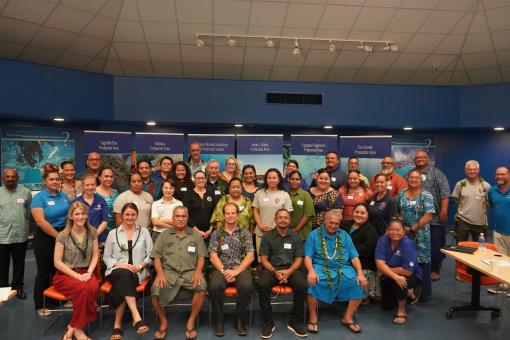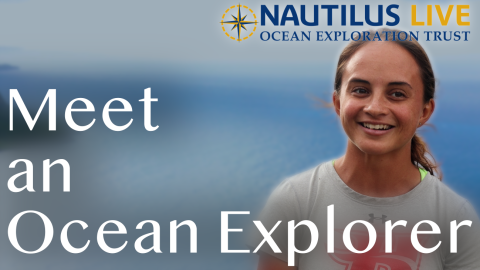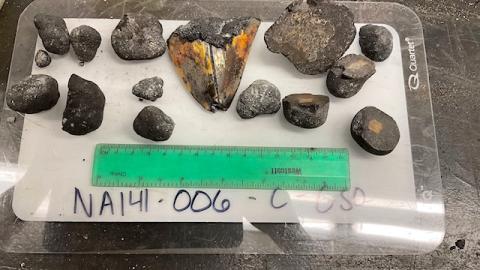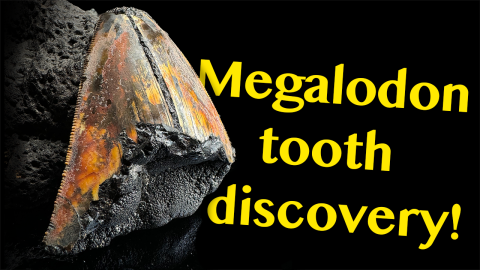OET Hosts Workshop in American Samoa for Stakeholder Input

On March 13, Ocean Exploration Trust (OET) in collaboration with the National Marine Sanctuary of American Samoa hosted a workshop at the Tauese P.F. Sunia Ocean Center to discuss deep-sea science and ocean outreach needs of the community.
OET is a US-based nonprofit organization that aims to explore poorly known parts of our ocean while pushing the boundaries of technological innovation, education, and outreach. In August-September 2024, OET will conduct two expeditions aboard its Exploration Vessel (E/V) Nautilus to explore deep-sea habitats around American Samoa in collaboration and consultation with the National Marine Sanctuary of American Samoa (NMSAS) and other partners. Funded by NOAA Ocean Exploration via the Ocean Exploration Cooperative Institute, these expeditions will map and characterize poorly known deep-sea habitats to support science and management priority needs in American Samoa, as well as engage students and the public in telepresence-based exploration.
The workshop convened community members for their input about how the science, education, and outreach capabilities of E/V Nautilus may be applied to best address the priority needs of local stakeholders in American Samoa. The workshop consisted of short presentations summarizing previous deep-sea explorations in American Samoa and E/V Nautilus’ capabilities, which was followed by small group discussions on how the forthcoming E/V Nautilus expeditions can best address local priority needs in science, education, and outreach.
“Ia ō gatasi le futia ma le umele” – May the essential components be of equal strength. The workshop was a great success, and all the planning and preparation were done in collaboration with local and federal partners”, shared NMSAS Superintendent Atuatasi-Lelei Peau.
The workshop was attended by over 50 people including stakeholders from these various government agencies and offices: American Samoa’s Department of Marine and Wildlife Resources, Department of Port Administration, Coral Reef Advisory Group, Environmental Protection Agency, Department of Port Administration, Visitor's Bureau, Department of Education including Tafuna High School, Samoana High School, American Samoa Community College, National Marine Sanctuary of American Samoa, NMSAS Sanctuary Advisory Council, US Fish & Wildlife Service, NOAA’s Offices of Ocean Exploration, National Marine Sanctuaries, National Marine Fisheries Service, NOAA Fisheries Office of Law Enforcement, National Weather Service, American Samoa Fisheries Observer Program, Pacific Islands Regional Office, the National Park of American Samoa, Palau International Coral Reef Center, University of New Hampshire, and Ocean Exploration Trust.
"In addition to exploring poorly known parts of our ocean and sharing the excitement of discovery with audiences of all ages, the Ocean Exploration Trust is committed to co-developing expeditions to ensure that they address local priority needs, as well as are executed in a manner that is culturally respectful and appropriate. This inter-institutional workshop laid a strong foundation to achieve all of these goals", said Daniel Wagner, OET’s Chief Scientist.
Surrounding the workshop through the week, the OET team met with additional stakeholders including briefing Governor Lemanu Peleti Mauga on the upcoming expeditions and meeting with Fata Brian Kaio, Samoa Consul General. A highlight of the week was the participation of a delegation from Palau International Coral Reef Center advancing collaboration of the teams within the sister sanctuaries of Palau National Marine Sanctuary and NMSAS.
OET’s 2024 expeditions visiting Hawaiʻi, American Samoa, US Pacific Remote Islands, Palau, and Canada will contribute to the ocean being better understood by supporting international scientific and U.S. governmental priorities, particularly understanding ocean changes, sharing that knowledge with others, and contributing discoveries and data that will inform future conservation and management decisions. Expeditions will include American Samoan educators, students, and scientists as part of the team onboard.
This collaboration will continue in the months ahead through continued meetings with stakeholders to develop an expedition plan for the August and September missions addressing input received. Those interested in sharing further community priorities for the planning process can find more information at NautilusLive.org.



